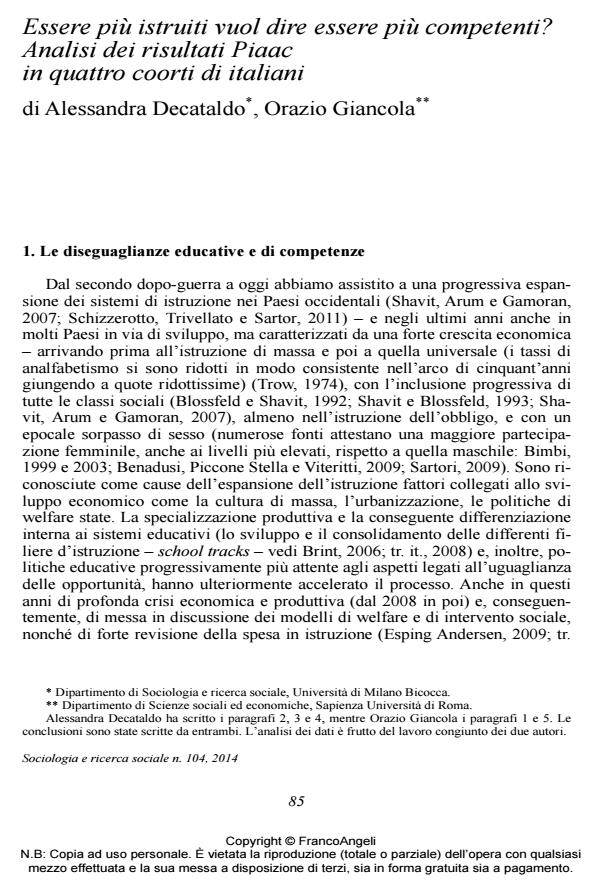Essere più istruiti vuol dire essere più competenti? Analisi dei risultati Piaac in quattro coorti di italiani
Titolo Rivista SOCIOLOGIA E RICERCA SOCIALE
Autori/Curatori Alessandra Decataldo, Orazio Giancola
Anno di pubblicazione 2014 Fascicolo 2014/104
Lingua Italiano Numero pagine 29 P. 85-113 Dimensione file 197 KB
DOI 10.3280/SR2014-104005
Il DOI è il codice a barre della proprietà intellettuale: per saperne di più
clicca qui
Qui sotto puoi vedere in anteprima la prima pagina di questo articolo.
Se questo articolo ti interessa, lo puoi acquistare (e scaricare in formato pdf) seguendo le facili indicazioni per acquistare il download credit. Acquista Download Credits per scaricare questo Articolo in formato PDF

FrancoAngeli è membro della Publishers International Linking Association, Inc (PILA), associazione indipendente e non profit per facilitare (attraverso i servizi tecnologici implementati da CrossRef.org) l’accesso degli studiosi ai contenuti digitali nelle pubblicazioni professionali e scientifiche.
This paper presents, a two-step analysis based on the new Piaac data (Programme for the International Assesment of Adult Population). Specifically: a) a study of the effects of ascriptive variables (as gender, parents’ education, etc.) on educational attainment in four age cohorts (born from 1946 to 1955, from 1956 to 1965, from 1966 to 1975 and from 1976 to 1985) aimed to produce an overview of the structure of educational inequalities over time; b) an analysis of the effect of the educational level when testing proficiency in reading skills (controlled by ascriptive variables and educational attainment). Thanks to the Piaac data features (which not only include background variables and the educational level, but also cognitive skills), this study aims to explore the advantage linked to the different educational levels on reading skills in the four age cohorts. Another goal of this essay is to analyse the influence of the ascriptive variables over the relationship between educational level and cognitive skills, in particular evaluating the effect of each of these independent variables and their dynamic over time.
- Disuguaglianze nel mercato del lavoro e transizione alla vita adulta. Una comparazione europea Orazio Giancola, Luca Salmieri, in SOCIOLOGIA DEL LAVORO 144/2016 pp.118
DOI: 10.3280/SL2016-144008 - Le “destinazioni educative” della Generazione X: risultati e disuguaglianze in una prospettiva generazionale Orazio Giancola, Matteo Bonanni, in Community Notebook. People, Education and Welfare in the Society 5.0 7/2024 pp.289
DOI: 10.61007/QdC.2023.3.163
Alessandra Decataldo, Orazio Giancola, Essere più istruiti vuol dire essere più competenti? Analisi dei risultati Piaac in quattro coorti di italiani in "SOCIOLOGIA E RICERCA SOCIALE " 104/2014, pp 85-113, DOI: 10.3280/SR2014-104005